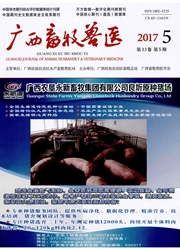

 中文摘要:
中文摘要:
采用MTT法测定不同浓度马尾藻多糖(Sargassum polysaccharide,SP)对正常猪脾淋巴细胞体外增殖及其感染猪繁殖与呼吸障碍综合征病毒(PRRSV)后培养活性的影响,并用Griess和ELISA法分别检测细胞培养上清液中一氧化氮(NO)、白细胞介素2(IL-2)和γ干扰素(IFN-γ)的水平。试验结果表明:25~400μg.mL-1的SP能协同伴刀豆球蛋白(ConA)显著促进T淋巴细胞体外增殖,400μg.mL-1的SP显著促进脂多糖(LPS)刺激的B淋巴细胞体外增殖活性。SP提高正常猪脾细胞体外培养不同时间段的NO分泌量,与对照组比较,差异显著(P〈0.05);不同浓度SP提高PRRSV感染的猪脾细胞体外培养分泌NO量,与病毒对照组比较,培养8 h时200μg.mL-1SP、12 h时100~400μg.mL-1SP、24 h时100μg.mL-1和400μg.mL-1SP均能显著地促进NO分泌(P〈0.05)。400μg.mL-1SP极显著促进体外培养的猪脾细胞分泌IL-2(P〈0.01),100μg.mL-1和400μg.mL-1SP显著促进PRRSV感染猪脾细胞IL-2和IFN-γ的分泌。结论:马尾藻多糖通过促进猪脾细胞增殖和分泌NO、IL-2和IFN-γ来调节免疫细胞活性和抗病毒能力。
 英文摘要:
英文摘要:
The purpose of this study was to investigate the effect of Sargassum polysaccharide ( SP ) on proliferation of splenic lymphocytes and immunocompetence in swine. The proliferation activity and production of nitric oxide ( NO ), IL-2 and IFN-γ were observed in spleenic lymphocytes with or without porcine reproductive and respiratory syndrome virus(PRRSV) infection, simuhaneouly treated with different concentrations of SP respectively. The results showed that T lymphocytes treated with concanavaline A (ConA) together with different concentrations of SP and B lymphocytes cells treated with lipopolysaccharisdes (LPS) together with concentrations of 400 μg·mL-1 of SP proliferated significantly. The secretion of NO in splenic lymphocytes infected with or without PRRSV infection,when the cells treated with SP, was promoted significantly(P〈0.05 )in different cultivation time as compared with control group. The production of NO in splenic lymphocytes with PRRSV infection were promoted significantly (P〈0.05), simultaneouly treated with SP at 200 μg·mL-1 at 8 h or 100-400 μg·mL-1 at 12 h or 100 and 400 μg·mL-1 at 24 h. The secretion of IL-2 in splenic lymphocytes treated with SP at 400 μg·mL-1 was raised markedly( P〈0.01 ). The secretion of IL-2 and IFN-γ in splenic lymphocytes with PRRSV infection,treated with 100 μg·mL-1 and 400 μg·mL-1 SP, were promoted significantly. In conclusion: SP improved the immunological activity and antiviral property on splenic lymphocytes in swine by promoting proliferation activity and increasing secretion of NO,IL-2 and IFN-γ.
 同期刊论文项目
同期刊论文项目
 同项目期刊论文
同项目期刊论文
 期刊信息
期刊信息
